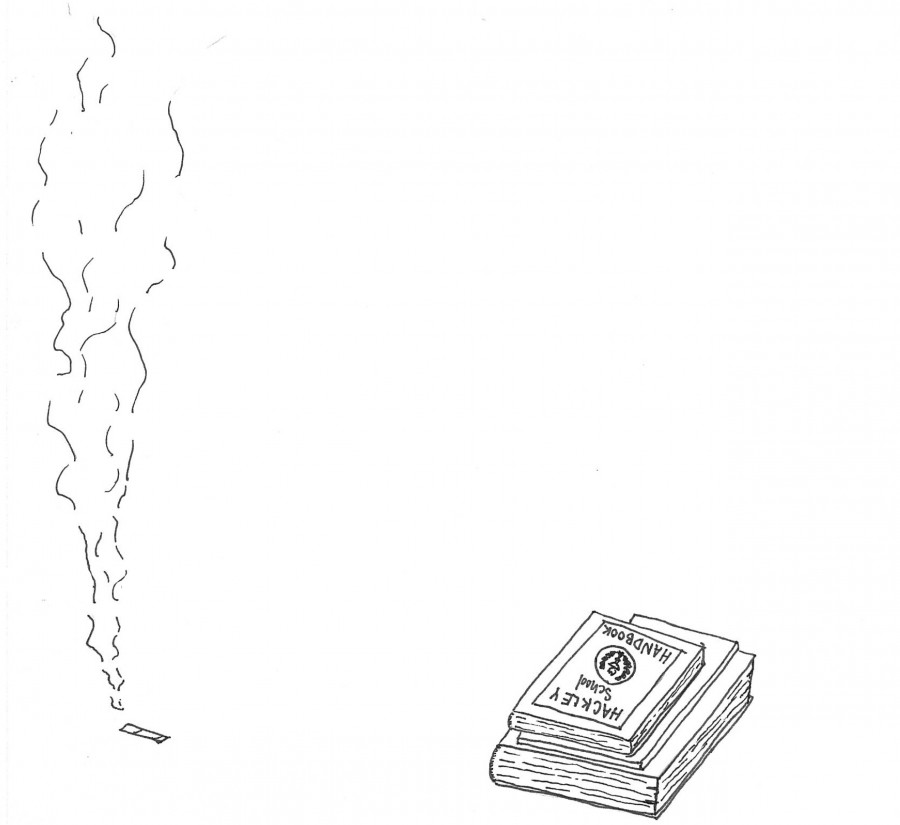Hackley Must Reconsider Zero Tolerance Drug Policy
Credit: Olivia Weinberg
February 16, 2016
Last issue, The Dial published an editorial encouraging Hackley to re-examine its drug disciplinary policy in light of the required withdrawal of two students for a drug policy infraction. While reconsidering the entire policy still makes sense there is one area of the policy that needs immediate attention: the school’s policy on marijuana use.
Forming school disciplinary policy is never an easy task. The school has the difficult job of having to act, effectively, as a ‘parent’ of hundreds of different kids from hundreds of different families during the school day and do as much as possible to ensure their safety.
But while it is rational and responsible for the school to take a very strict disciplinary approach on marijuana use, American culture at large often treats the drug very differently. Marijuana is often celebrated in popular culture. This past April 20th, Billboard ran an article entitled “4/20 Songs: 20 Smokin’ Tunes About Weed.“ ‘Smoke-outs’ are regularly held at college campuses to support ‘cannabis culture. We smell weed whenever we walk through New York City at night, and Facebook even displays us advertisements for “magic herb grinders,” a not-so-subtle euphemism for marijuana paraphernalia.
Most strikingly, four states in our union and our nation’s capital territory have all voted to explicitly legalize the recreational use and cultivation of marijuana. Even in our home state of New York, marijuana use has been largely decriminalized; first-offense possession of up to 25 grams of marijuana in New York States is a civil violation – like a traffic ticket, and not a ‘crime’ (misdemeanor or felony) – with a maximum punishment of a $100 fine. The future likely holds further decriminalization; a 2015 Gallup poll showed that a real majority, 58%, of Americans support the legalization of marijuana use, including 71% of those polled that were born in or after 1981. Fittingly, its use among young people has become almost commonplace: while data pertaining to Hackley students specifically was not available to The Dial, nationwide data sourced from government agencies suggest that around half of Americans between ages 18 and 20 have tried marijuana at some point in their lives. Even if Hackley students significantly ‘beat’ this average, it stands to reason that a not-insignificant minority of young adults in our community have experience with marijuana.
Of course, there is a very great difference between marijuana use by a minor and that by an adult. Let’s be clear: marijuana seems to pose risks to developing minds and has been associated with changes in the teenage brain, lower memory and intelligence, and some other risks – its overall safety has yet to be settled. But even with all of these risks considered, marijuana compares favorably with alcohol, a drug we culturally tolerate the underage use of and one whose use has been punished less severely by Hackley. A recent survey of the available data by a professor of pediatrics at the Indiana University School of Medicine concluded that “When someone asks me whether I’d rather my children use pot or alcohol, after sifting through all the studies and all the data, I still say ‘neither.’ … But if I’m forced to make a choice, the answer is ‘marijuana.’”
With all of this in mind, it becomes impossible to justify Hackley’s policy on marijuana use. The policy is by no means totally draconian, and includes commendable exemptions from major disciplinary action for students who seek school support in dealing with a drug problem or are under immediate, life-threatening duress. Yet Hackley still maintains a policy that, in practice, too harshly punishes students for engaging with a substance that our culture sends mixed signals about.
Hackley says in no uncertain terms that students who possess or use either drugs or alcohol on campus should expect to be required to withdraw from the school – a gentle expulsion – and has historically issued the same punishment even for off-campus marijuana use. While it may seem that such a policy is necessary to maintain the integrity of the school environment, this assumption should no longer be taken as a rule. Many boarding schools, such as Taft School in Connecticut, have an effective ‘two-strike’ policy on marijuana use – meaning students are not asked to withdraw after first use, even on campus. Taft’s handbook instead states that “Students who violate the Alcohol/Drug Rule will be required to undergo a formal assessment by the school counselors and agree to participate in ongoing work with those counselors if recommended” – such a policy takes away the looming threat of automatic withdrawal, leaving specific consequences ambiguous and in the hands of counselors.
Moreover, some of Hackley’s regional day-school peers, like the Riverdale Country School, do not mirror Hackley’s zero-tolerance like policies, even for on-campus use. Riverdale’s handbook states that “the school seeks to prevent the use, possession, and distribution of chemical substances or so-called drug paraphernalia on campus or during school events, activities, or trips. Use, possession, or distribution may result in strong administrative disciplinary action leading up to and including expulsion.” Again, specific consequences are left unclear – allowing administrators to mete out punishments short of required withdrawal for pot-smoking.
No one is asserting, of course, that Hackley should tolerate drug use on its campus. But considering our culture’s mixed signals on marijuana and the fact that our contemporaries do not make expulsion the immediate expectation for such an offense should give us pause. Removing required withdrawal as the automatic consequence for casual pot use would put Hackley in step with many of its peer institutions, and allow the school to deal more fairly and sensitively with a subject that is under constant debate in our society.

